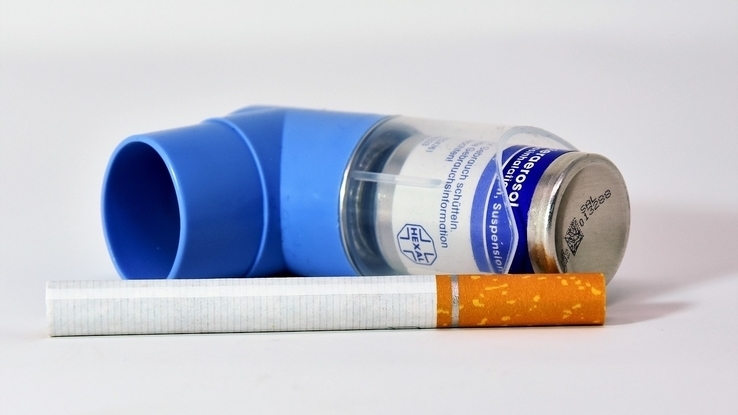How Long Does Bronchitis Take to Go Away

Treatments for chronic bronchitis include medication, surgery, therapy and above all, lifestyle changes. While chronic bronchitis isn't usually a life-threatening condition in and of itself, it can cause serious medical complications over time, so you should schedule an appointment with your doctor if you suspect you have it.
Bronchitis refers to inflammation of the breathing tubes, or bronchi, which in turn causes the body to produce large amounts of mucus. Acute bronchitis usually goes away within 10 weeks, although a cough may linger for sometime afterward. If you regularly have a cough and mucus for three months out of the year for two years in a row and it isn't caused by some other source, however, then you have chronic bronchitis.
When inflammation of the breathing tubes becomes severe enough, it takes much longer to go away. While the exact causes of a case of chronic bronchitis may not always be known, smoking is often tied to it due to the effect cigarette smoke has on the lungs. According to the University of California San Francisco, while only 15 percent of smokers develop it, more than 90 percent of people who do have chronic bronchitis have a history of smoking. That said, not everyone who gets chronic bronchitis has ever smoked. Frequent exposure to air pollution, toxic gases or airborne dust can also cause it.
Other factors that increase the likelihood of getting chronic bronchitis include exposure to childhood respiratory illnesses, secondhand smoke or a family history of lung disease. Women and people who experience gastroesophageal reflux disease (GERD) — more than two cases of acid reflux a week — are also more likely to develop it.
Symptoms of chronic bronchitis include frequent and persistent coughing and respiratory infections, shortness of breath during ordinary activities, fatigue, wheezing and unusual levels of mucus production. You may also experience chest pains and blueness around the lips or the bases of your fingernails.
Chronic bronchitis is a form of chronic obstructive pulmonary disease (COPD), a term doctors use to refer to a larger group of conditions that make it harder to breath over time. In the United States, it usually refers to chronic bronchitis or emphysema.
Treating Chronic Bronchitis
While chronic bronchitis cannot be fully cured, it can be treated to ease symptoms, reduce flare-ups and improve quality of life. While medications, surgeries and therapies exist, the most important things you can do to treat it are all lifestyle changes.
It's essential to quit smoking and avoid other possible irritants to the lungs, including secondhand smoke. According to the Mayo Clinic, wearing a face mask can help prevent symptoms from getting worse if you're in a situation where you might be exposed to air pollution, paint fumes, household cleaners or similar substances. It can also help with cold air, which may increase coughing and breathing problems. Similarly, a humidifier can make breathing easier since warm humid air loosens mucus in the airways, although you should clean it regularly to avoid the growth of bacteria and fungi. While exercise isn't always possible if you have chronic bronchitis, it can keep you healthy and in a better state to handle your symptoms.
Medication
If you have chronic bronchitis, your doctor may prescribe a number of different medications depending on the severity of your case. They may come in pill form or be used through an inhaler. Bronchodilator medications come in both forms and relax the air passages in the lungs, making breathing easier and reducing symptoms. Steroids in the form of aerosol sprays can relieve the symptoms of chronic bronchitis, but extended use over time may lead to high blood pressure, diabetes, weak bones and cataracts.
Antibiotics don't treat chronic bronchitis directly, but they can be helpful in treating infections that happen as a result of the condition. Annual flu shots and a pneumonia shot every five to seven years are important for people with chronic bronchitis, as they are less likely to be able to recover from either.
Therapy
There are a number of therapies that people with chronic bronchitis can benefit from, especially if they have difficulty with making lifestyle changes to reduce symptoms on their own. Pulmonary rehabilitation involves learning breathing practices, such as pursed-lip breathing; exercise and nutrition planning; education on what triggers worse episodes of chronic bronchitis and help quitting smoking. Group therapy for tobacco addiction may also be prescribed.
Many people with chronic bronchitis find it harder and harder to breathe as time goes on. Oxygen can help with this problem, and it can be provided through various devices in different settings, from the home to the hospital to daily life out in public.
Surgery
In some cases of chronic bronchitis (as well as COPD more broadly), surgery may be needed to remove damaged parts of the lungs. Lung volume reduction surgery (LVRS) can help the lungs breathe more easily by removing around 30 percent of the most damaged lung tissue, which allows the remaining lungs to work more efficiently. It can improve overall quality of life and even help the diaphragm if it's also been damaged, although not all people with chronic bronchitis qualify for it.
Another option if the lungs are too damaged to salvage is a lung replacement. However, the procedure does carry risk and requires immunosuppressants to be taken afterward, so the surgery is only recommended if other options have been exhausted.
MORE FROM SYMPTOMFIND.COM
How Long Does Bronchitis Take to Go Away
Source: https://www.symptomfind.com/health/how-treat-chronic-bronchitis?utm_content=params%3Ao%3D740013%26ad%3DdirN%26qo%3DserpIndex
0 Response to "How Long Does Bronchitis Take to Go Away"
Post a Comment